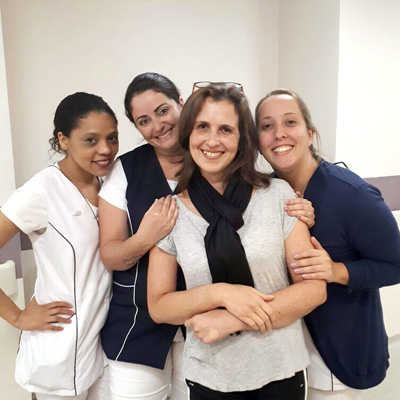Sometimes, life needs a reboot. It can be necessary to close something down before things can be started afresh.
When I hit my rock bottom, it was the rather frightening prospect of stoma surgery that gave me the restart I needed. In September 2016, I became a permanent ostomate. Starting again wasn’t easy to begin with. I’d lost part of myself, and I needed a period of grief and reflection before I was ready to rebuild my life.
Getting used to having a pouch permanently attached to my tummy wherever I go was a long and drawn-out process. However, within a year and a half, I felt I had more than overcome my negative feelings. I was proud of my experiences and ready to share them.
A devastating possibility
Since I was diagnosed with Crohn’s disease in 1990, I went through so many hospital admissions that I honestly lost count. In this time, I met my husband and gave birth to our two children.
Crohn’s is an inflammatory bowel disease (IBD), and people living with it also live with the knowledge that they are more likely than average to develop cancer in the areas affected by inflammation. Though this risk is still small, it gets bigger the more severe and frequent the inflammation, and the longer someone has had the condition.
‘I’d lost part of myself’
Evidence shows that this becomes something to get checked after 10 years. By September 2016, my Crohn’s had been inflaming the same part of my bowel for 26 years, and I had to face up to the very real possibility of it leading to a devastating cancer at any time. If bowel cancer manages to spread to other parts of the body before it is caught, it is often lethal. What makes it worse is that the early signs of bowel cancer can be hard to detect when you have IBD, as the symptoms are fairly similar.

In hospital with the nurses
Surgical solutions
My doctors presented me with a solution: a partial colectomy. This would mean losing part of my bowel and having to use a pouch for the rest of my life. It was very difficult for me to accept a very important part of my body being amputated. For days and weeks, I struggled to come to terms with the idea. But when I thought of how much I loved my life and my family, I did not think anything was worth the risk of losing them, and I decided to have the surgery.
My operation turned out to be a very complicated one, and it took more than 8 hours to complete. I certainly did not expect to wake up without an anus, but I did, and was told that, due to the extent of the damage caused by inflammation, it had to be removed alongside the rectum and sigmoid colon.
Sticking around
New stomas can be temperamental, and after 10 days, things took a turn for the worse. My stoma had retracted back into my body, and so I was brought back to the theatre for open surgery it to be pulled out again.
Once this was done, I had a brief 3-day respite until again I started feeling worse. This time, I couldn’t drink anything, and I started throwing up; it kept getting worse and worse. I was taken to intensive care, where I would spend more than 16 days. Scans showed my colon was obstructed by adhesions—fibrous bands of scar tissue that often develop after open surgery. They were sticking my colon together and preventing food passing through.
‘New stomas can be temperamental’
It would be a very difficult time, for much of which I couldn’t even walk, drink, eat or breathe properly. To stay alive in intensive care, I had to have nutrients pumped straight into my bloodstream, and I eventually underwent a blood transfusion. During those days of agonising struggle, I dealt with very negative thoughts alongside the physical pain, and I found myself contemplating having to leave my children without a mother.

Walking by the waterfalls
Back again
Luckily, the surgeons were able to cut the lesions and free up my bowel with a procedure called lysis. By the time I was discharged, I had undergone three operations and spent 34 days in hospital.
When I got home, I realised I was still too weak to even walk properly. What’s more, it was not over. A complication of one of the operations had left me with a parastomal hernia, when part of the bowel sticks out beneath the skin through a gap in the muscle wall around the stoma. Though a hernia can be uncomfortable, it was not urgent, and I had to wait until April 2017 until I could have it repaired surgically. There were, of course, further complications, and 3 weeks later I developed another set of obstructive adhesions and had to go back to the emergency department for more surgery. At this point, I had had five complicated operations over 8 months.

At the beach with the family
Hard reset
When I finally came home, reassured there were no more complications, the relief was indescribable. I was too weak to really do anything at first, but I was determined it was time to start life anew.
It did take some psychological adjustment. For a few days, I struggled to look in the mirror; I didn’t want to accept my new reality. My husband had been there for me throughout the ordeal, and he helped me clean and change the flange until I was strong enough to do it myself.
‘the relief was indescribable’
Still, I had begun to fear I would never be able to come back to the life I had so enjoyed living—that the physical challenges of my condition would keep me from the simple pleasures. This was not to be. Gradually, a day at a time, my strength came back to me, and with it my happiness and independence. I realised my stoma pouch wasn’t going to define or confine me, and I was the same strong and independent woman, able to enjoy life again in all its senses. Soon I was able to play with my children and make love with my husband. We started going to the beach, and then travelling.
From Rio to California
Around 6 months after leaving the hospital, I went to the beach with my family, where we spent 7 wonderful days travelling by car along the coast of the Brazilian state of Rio de Janeiro. I was initially nervous and worried about how it would turn out. After asking for some tips from support groups on Facebook, I knew to bring enough of the right stoma care kit with me, and so I started to feel more relaxed. It is always good to bring the double what you expect to need! Everything went well; I even was able to go snorkelling, which I loved, despite some pain caused by my hernia. That experience really made it clear to me that it was possible to do whatever I wanted with my stoma.
More recently, I took a month-long trip around California, USA. This was a long journey from Brazil. It took more than 18 hours, including connections. However, everything went perfectly well. Whenever I thought it might be helpful to inform people I had special requirements, they were all happy to make allowances that would make my life easier.
Friends near and far
Looking back, there were certain people who really helped me to overcome the challenges of this period. I’ve received a massive support from my husband through all these the difficulties. He’s been my lifetime companion; he was there for me at all times and spent many nights in hospital with me. And now he continues to encourage me do the all the things that I’ve wanted to do. My children, although they are still only young, have always supported me with their kind words.
‘it’s something to be proud of’
Before going in for surgery, I had the idea of setting up an Instagram account to interact and share life stories with other ostomates and Crohn’s patients. I’ve since found it to be a positive way to become involved in this new universe. I have also joined some stoma support groups, both in Brazil and overseas. The people I meet this way have shown me massive support. Some have become close online friends, and we are planning to meet up in the future.

Beneath the waves with the fishes
A matter of pride
I’ve found it helpful to keep on the lookout for the best ostomy setup. I’ve recently bought myself a nice new hernia belt support, and I’ve perfected a way of dressing using maternity or high-waist pants with a belt that manages to disguise the hernia and the bag.
Bowel disease and stoma surgery can have a terrible effect on self-esteem, but, as the days and weeks pass by, mine has been flooding back, and I feel very proud of who I am in my body. I even submitted a picture of myself for the Stomawise 2018 calendar.
I’ve found it helped to never let yourself be ashamed of saying that you have a bag. As a sign of your resilience and love of life, it’s something to be proud of. In the end, as ostomy is often a second life, a chance to have what matters back again after disease threatens to take it. Having a stoma has made me enjoy my life more than ever, and I feel I am doing my best in everything I do.
 Luciana Podschun lives with her husband and their two boys, and she enjoys nature, travelling and gastronomy
Luciana Podschun lives with her husband and their two boys, and she enjoys nature, travelling and gastronomy
The contents of this page are property of MA Healthcare and should not be reused without permission

